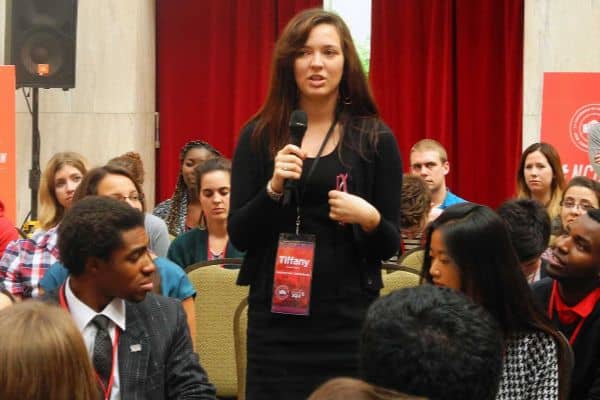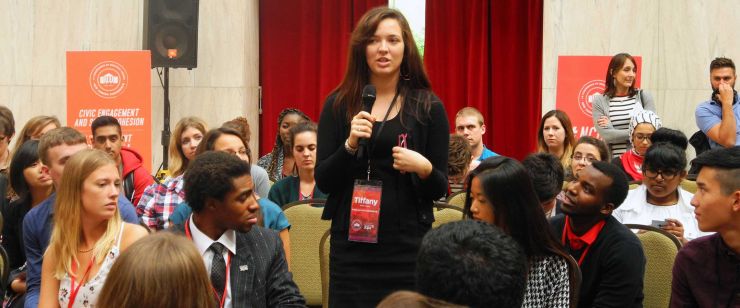
New Canada Conference: 100 changemakers create idea book on pressing issues

“We don’t all have to be the same in order to stand up for each other,” said Jacq Brasseur, a Northwest Territories delegate at the New Canada Conference. Indeed, the 100 young change leaders gathered for the conference between August 31 and September 3 in Charlottetown, Prince Edward Island, came from every province in Canada. They hailed from diverse ethno-cultural, religious, linguistic and Aboriginal backgrounds.
The Inspirit Foundation was one of the proud partners in this conference, whichwas commissioned by PEI 2014 to commemorate the 150th anniversary of the Charlottetown Conference. Other partners include the CBC, Via Rail and Community Foundations of Canada.
Over the course of three days, delegates learned from and worked closely with leading Canadian scholars, community activists, health and legal professionals in eight teams. Each team tackled themes such as justice and equity, civic engagement and social cohesion, and Canada’s place in the world. Their perspectives on the choices, forces, and ideas that will shape Canada’s future were then compiled into an idea book which will be published and shared with the public.
Besides producing the idea book, the New Canada Conference was also an invaluable opportunity for Canada’s next generation of leaders to connect, collaborate and plan for Canada’s future as a pluralistic and inclusive country.
During the Peer Talks session, delegates heard each other’s personal stories that drive them to be invested in Canada’s future. Zakariya Abdulle, for example, related his experience with racism and discrimination in growing up as an African-Canadian in Toronto. Another delegate, Simone Cavanaugh, explained how her experience growing up in a wheelchair sparked her interest in International Human Rights Law, particularly in disability rights. Nigel Robinson, an aspiring comedic actor from Edmonton, Alberta, left the group in stitches as he talked about using humor to deal with his struggles as an Aboriginal youth.
Discovering commonalities
According to the conference’s keynote speaker Hayden King, opportunities to share experiences are the unifying force among Canada’s diverse communities.
In his keynote address, the Director of the Centre for Indigenous Governance and Assistant Professor of Politics at Ryerson University suggested that Canada’s future as imagined by immigrants and refugees may not be so different than the one imagined by the country’s First Nations, Innuit and Métis peoples. The challenge is to look past differences and work toward a common future.
Premier Robert Ghiz reminded delegates on the final day of the conference that compromise is key. In his closing remarks, Ghiz explained that those who founded Canada did not all agree with each other when they convened in Charlottetown 150 years ago. However, disagreement did not stop them from conceiving the idea of Canada. Ghiz’s advice to delegates was to realize that we may disagree with each other but through compromise, a better Canada is possible.